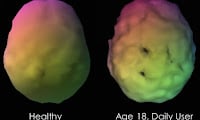CARE, DRUGS & MOOD:
A creative technique called “DICE” empowers caregivers, patients & professionals to work together and reduce dementia’s behavioral problems. Learn how it can help cut antipsychotic drugs and make life easier for everyone.
ANN ARBOR, Mich. — A helpful approach to handling agitation, aggression and other unwanted behaviors by people with dementia may help reduce the use of antipsychotics and other psychiatric drugs in this population, and make life easier for them and their caregivers, a team of experts says.

Publishing their recommendations under the easy-to-remember acronym of “DICE”, the panel of specialists in senior mental health worked toward sparking better teamwork among those who care for dementia patients at home, in residential facilities and in hospitals and clinics.
In fact, the federal agency that runs Medicare and funds much dementia-related care made the DICE approach an official part of its toolkit for reducing the use of antipsychotic drugs and other mental health medications in people with dementia.
Though these drugs may still help some patients, the important paper in the Journal of the American Geriatrics Society said many non-medication approaches could also help reduced unwanted behaviors, also known as neuropsychiatric symptoms of dementia. But it takes teamwork and communication to do it.
Most people with Alzheimer’s disease and other memory-affecting conditions also get aggressive, agitated, depressed, anxious, or delusional from time to time, said senior author Helen C. Kales, M.D., head of the U-M Program for Positive Aging and Geriatric Psychiatry at the University of Michigan Health System and investigator at the VA Center for Clinical Management Research . Or, they might have delusions, hallucinations, or lose inhibitions.
“Often more than memory loss, behavioral symptoms of dementia are among the most difficult aspects of caring for people with dementia. These symptoms are experienced almost universally, across dementia stages and causes,” she said. “Sadly, these symptoms are often associated with poor outcomes, including early nursing home placement, hospital stays, caregiver stress and depression, and reduced caregiver employment.”
Doctors often prescribe these patients medications that are used in patients with mental health disorders, despite little hard evidence that they work well and despite the risks they can pose — including hastening death. Meanwhile, studies have shown promise from non-medication approaches to changing dementia patients’ behavior and reducing triggers for behavioral symptoms in their environment and daily life. But too few health teams are trained in their use.
Kales and her colleagues Laura N. Gitlin, Ph.D. and Constantine G. Lyketsos, M.D. from Johns Hopkins University authored the paper on behalf of a group of experts, called the Detroit Expert Panel on the Assessment and Management of the Neuropsychiatric Symptoms of Dementia, who developed the DICE approach.
Sponsored by Kales’ program, the national multidisciplinary panel of experts met in Michigan to create a comprehensive approach to behavioral management.
Dubbed “DICE” for Describe, Investigate, Evaluate, and Create, it details key patient, caregiver and environmental considerations with each step of the approach and describes the “go-to” behavioral and environmental interventions that should be considered.
Briefly described, the components are:
- D: Describe – Asking the caregiver, and the patient if possible, to describe the
- Who
- What
- When
- Where
of situations where problem behaviors occur and the physical and social context for them. Caregivers could take notes about the situations that led to behavior issues, to share with health professionals during visits.
- I: Investigate – Having the health provider look into all the aspects of the patient’s
- health
- Dementia symptoms
- Current medications
- Sleep habits
that might be combining with physical, social and caregiver-related factors to produce the behavior.
- C: Create – Working together, the patient’s caregiver and health providers develop a plan to prevent and respond to behavioral issues in the patient, including everything from
- Changing the patient’s activities
- Adjusting the environment
- Care education
- Support for the caregiver.
- E: Evaluate – Giving the provider responsibility for assessing
- How well the plan is being followed
- how it’s working
- What might need to be changed.
The authors say that doctors should prescribe psychotropic drugs only after they and the patient and caregiver have made significant efforts to change dementia patients’ behavior through environmental modifications and other interventions, with three exceptions related to severe depression, psychosis or aggression that present risk to the patient or others.
Now, the authors say, health providers of all kinds who care for dementia patients should familiarize themselves with the DICE approach – as should the spouses, adult children and others who care for dementia patients at home.
“Innovative approaches are needed to support and train the front-line providers for the burgeoning older population with behavioral symptoms of dementia,” says Kales, a professor in the U-M Medical School’s Department of Psychiatry and member of the U-M Institute for Healthcare Policy & Innovation . “We believe that the DICE approach offers clinicians an evidence-informed structured clinical reasoning process that can be integrated into diverse practice settings.”
Gitlin, who directs the Center for Innovative Care in Aging at the Johns Hopkins School of Nursing, adds, “The DICE approach is inherently patient- and caregiver-centered because the concerns of individuals with dementia and their caregivers are integral to each step of the process. DICE also enables clinicians to consider the roles of nonpharmacologic, medical and pharmacologic treatments concurrently.”
Lyketsos, chair of the Department of Psychiatry at Johns Hopkins Bayview, stresses that the approach “has tremendous utility in clinical trials of treatments for behavioral symptoms, particularly in testing new medications. DICE can be used to better subtype behaviors, or focus on particular behaviors at randomization coupled with systematic treatment approaches”.
Reference: Journal of the American Geriatrics Society, Volume 62, Issue 4, pp 762–769, April 2014
Learn more about the U-M Program for Positive Aging , including its resources for health care providers to assist with management of behavioral aspects of dementia
SOURCE:
University of Michigan












Very behavior analytic.
A very popular non-medication approach to problem behaviors is to use music to calm, distract or stimulate the person. Meaningful music has been proven to do this and spark memories. You can create a 12 page LifeSongs book using photos and then recording 12 favorite songs. These books are used over and over again and can be taken anywhere. You can order them at LifeSongs.info. They are a wonderful tool.
Could you give me a more specific address. Would like to look into this book. I only get other lifelong hits when googling. Thanks, Gail
what drugs are antipsychotic? My wife takes donepezil 10mg, Namenda 28mg, sertraline hcl 100mg, and simvastatin 10mg
The Zoloft (sertraline) is a 'mental health' drug. (anti depression) Likely it was prescribed for sad crying type behaviors(?)
Some people lump all mental health drugs into an 'anti-psychotic" label, which isnt exactly true. There are many different types of mental health drugs which are used in dementia to control behaviors such as hallucinations, violence, overt sexual behaviors and obsessive compulsive behaviors.
The main point is that people with dementia use (are forced to use?) behaviors to communicate. Wander when their bladder is full, become violent when bathing due to a fear of water, cry when hungry, etc. Before focusing on stopping a particular behavior a caregiver should try to discover if there a cause for it. Correcting the cause can SOMETIMES end a behavior.
However it should be noted that medication IS sometimes very necessary and appropriate to make the person manageable and comfortable. But it should NEVER be the FIRST thing to try.
As an FYI – You might want to inquire why your wife is on simvastatin?
Is her cholesterol level really a concern?
Are YOU really concerned about preventing a heart attack or stroke 5-10 years into the future?
Or is this perhaps something that she had been taking for a long time before the dementia and nobody has reevaluated the need for it. . . .?
This is an important conceptual step being provided by this paper and hopefully it will direct attention to innovative, non-drug, non-invasive approaches to reducing symptoms and potentially treating the underlying neuropathology in neurodegenerative disorders like dementia. Our work with 1072nm infrared light and brainwave biofeedback training are two examples of approaches that could be considered before prescribing psychotropic medications. Both technologies can safely and inexpensively be provided by caregivers or by professionals in outpatient settings and remotely via the internet.
Marvin Berman PhD http://www.quietmindfdn.org